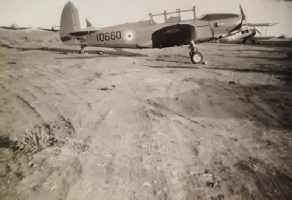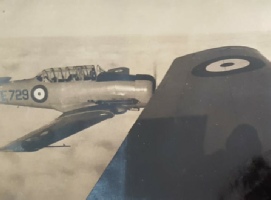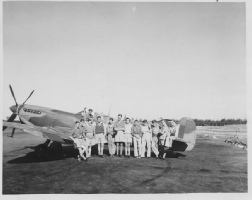Herman Goering,  head of the Luftwaffe (the German air branch) inadvertently helped the British by ordering an end to the raids on their radar bases. On Sept. 17 Hitler deferred the invasion of Britain, but continued with nighttime bombing raids.
head of the Luftwaffe (the German air branch) inadvertently helped the British by ordering an end to the raids on their radar bases. On Sept. 17 Hitler deferred the invasion of Britain, but continued with nighttime bombing raids.
Everyone in his northeast England town had bomb shelters in their yards, Lawrence recalls. “Nearly every night the sirens would go to warn us there was an air raid on the way. There were not many telephones around in England at that time, but we had one. My dad used to have to go and wake up the wardens. “My future wife (Sheila Watson) had been to the pictures (movies) when there was an air raid warning, so she dashed home. She just got there ... and a bomb dropped. They had fireplaces where they burnt coal. They were in the room just in front of the fireplace – her mom, her sister and herself. The bomb scattered all the soot down the chimney. It covered the room and all of them, broke all the windows. (The bomb) was in the backyard. But they were OK. Her father was out as an air raid warden. He was OK too.”
The bomb scattered all the soot down the chimney. It covered the room and all of them, broke all the windows. (The bomb) was in the backyard. But they were OK. Her father was out as an air raid warden. He was OK too.”
“Where he grew up was a steelworks,” Marc adds. “So, the Germans were coming across and bombing it on a regular basis. It was generally one of the few places in the UK that was constantly bombed.” Upon joining the RAF Lawrence took a number of courses in England before being sent to Canada to take flying lessons. He was trained in Calgary and De Winton, Alta., and got his flying wings on Oct. 15, 1943.
“After I got my wings I moved further into Canada and did another course – to be a flying instructor – which I passed. Then I went back to the UK and instead of (instructing), I came out ... to I taly and flew Spitfires.” In Italy, Lawrence was responsible for shielding his fellow 208 Squadron pilots. “My job was to protect the guy who was doing the looking. So I was responsible for protection of the person doing the looking to see what the enemy was doing. “He was looking down and I was looking around, all the time, to make sure he was safe. I was nervous, but we were trained to do this.”
taly and flew Spitfires.” In Italy, Lawrence was responsible for shielding his fellow 208 Squadron pilots. “My job was to protect the guy who was doing the looking. So I was responsible for protection of the person doing the looking to see what the enemy was doing. “He was looking down and I was looking around, all the time, to make sure he was safe. I was nervous, but we were trained to do this.”
Once the war was over Lawrence was sent to Israel (then Palestine) for a year. “Mostly I was doing searches of the Mediterranean at that time, because there were many people who wanted to get to Israel that weren't supposed to ... from Europe.”








